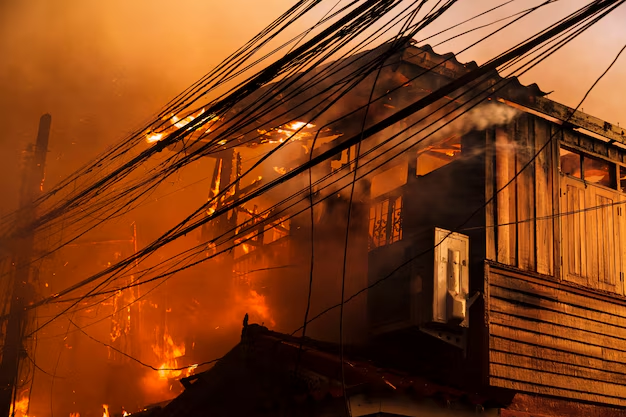Is Your Home and Belongings Safe? Understanding Renters Insurance and Wildfire Coverage
In recent years, wildfires have posed an increasing threat to many regions, leaving renters worried about the safety of their homes and belongings. This concern raises the critical question: Does renters insurance cover wildfires? For many renters, understanding how their insurance policy works can be as confusing as it is essential. This guide offers a clear, authoritative look at renters insurance, its coverage in the event of wildfires, and how you can ensure you’re protected.
🔍 What is Renters Insurance?
Before diving into wildfire coverage, it’s essential to grasp what renters insurance is. Renters insurance is a type of coverage designed to protect tenants living in rented properties. Unlike homeowners insurance, renters insurance typically covers the tenant’s personal belongings and liability, not the structure of the dwelling itself.
Here are some key aspects of renters insurance:
- Personal Property Coverage: This protects your belongings, such as furniture, electronics, and clothing, from damages or loss due to covered perils.
- Liability Coverage: Provides protection if someone is injured in your rented space and holds you responsible.
- Additional Living Expenses: Offers assistance for temporary housing and related costs if your residence becomes uninhabitable due to a covered event.
Are Wildfires Covered by Renters Insurance?
The answer to whether renters insurance covers wildfires is generally yes, but there are nuances. Wildfires are often included under the perils that are covered in standard renters insurance policies. This means if a wildfire damages or destroys your personal property, your renters insurance policy is likely to provide coverage.
Key Takeaways on Wildfire Coverage:
- Personal Belongings: Renters insurance covers the replacement or repair of personal items damaged by wildfire.
- Living Expenses: If your home becomes uninhabitable due to a wildfire, renters insurance may cover additional living expenses like hotel bills.
- Exclusions: Always review your policy for any exclusions regarding specific types of damage or regions prone to large-scale wildfires.
🌲Understanding Coverage Limits and Deductibles
When you obtain renters insurance, you’ll usually select your coverage limits and deductibles, which can impact how much compensation you receive and your out-of-pocket expenses.
Coverage Limits:
- Coverage limits define the maximum amount your insurance will pay out for a covered claim. It’s crucial to choose an adequate limit reflecting the value of your belongings.
Deductibles:
- A deductible is the amount you pay toward a loss before your insurance kicks in. Lower deductibles mean higher premiums but less out-of-pocket expense during a claim.
How to Determine If You Have Wildfire Coverage
Not all insurance policies are created equal. Here are steps you can take to determine if your renters insurance policy offers wildfire coverage:
- Review Your Policy: The policy declarations page will provide details on what perils are covered.
- Contact Your Insurer: Reach out to your provider for specific queries about wildfire coverage and any regional considerations.
- Consult Policy Documents: Check for terms like "fire," "wildfire," or similar terminology, as different insurers might phrase coverage differently.
🔑 Important Considerations and Tips
When managing risk and coverage around wildfires, here are some critical considerations and tips:
1. Know Your Region
- If you live in a wildfire-prone area, understanding local risks and insurance regulations is essential. Some insurers might have specific guidelines or exclusions for such regions due to high risk.
2. Inventory Your Belongings
- Create a Home Inventory: Documenting your belongings with photos and receipts can streamline the claims process and ensure accurate compensation.
3. Understand Policy Exclusions
- Carefully review potential exclusions within your policy. Some policies may exclude coverage for wildfires if risk assessment fluctuates over time.
4. Consider Additional Coverage
- Depending on your risk assessment, it may be worth considering additional coverage or endorsements for high-value items or extensive risks.
📊 Visual Summary: Key Points on Renters Insurance and Wildfire Protection
Here’s a concise breakdown of what you need to know about renters insurance coverage for wildfires:
| Key Element | Description |
|---|---|
| Personal Property | Covers replacement or repair of items. |
| Coverage Limits | Ensure limits reflect personal belongings' value |
| Deductibles | Choose an amount that balances premium costs |
| Additional Expenses | Covers temporary lodging if needed |
| Exclusions | Review policy for any wildfire-related exclusions |
| Region Risks | Understand local wildfire risks |
| Policy Updates | Keep your coverage updated with changing needs |
💡 Next Steps: Strengthening Your Wildfire Readiness
Preparation is vital in regions at risk for wildfires. Consider these proactive steps to enhance your protection:
- Emergency Planning: Ensure you have a practical evacuation plan, including essential items and contact lists.
- Home Precautions: Maintain cleared areas around your home to reduce fire risk.
- Financial Safety Nets: In addition to insurance, consider setting aside savings for emergencies.
Whether you’re a seasoned renter or new to renting in an area where wildfires are a concern, being informed about the extent of your policy’s coverage and taking action can significantly impact your financial resilience. With the right renters insurance policy in place, you can gain peace of mind knowing that your belongings and living situation are better protected against the unpredictable threat of wildfires.

Related Topics
- Can a Landlord Require Renters Insurance
- Can I Add People To Usaa Renters Insurance
- Can Renters Insurance Cover Mold
- Can You Cancel a Renters Insurance Policy Early
- Can You Legally Rent a House Without Renters Insurance
- Do Apartments Cancel You Renters Insurance
- Do I Have To Have Renters Insurance
- Do I Need Renters Insurance
- Do Landlords Require Renters Insurance
- Do Renters Insurance Cover Mold
